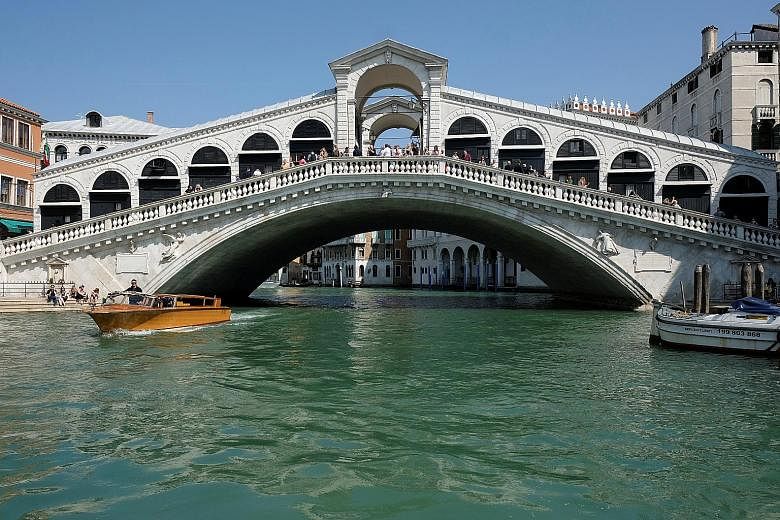VENICE • Italian police have dismantled a suspected terrorist cell whose members had discussed blowing up the Rialto Bridge, one of the top tourist attractions in Venice.
Three Kosovar men living in Italy were arrested in overnight raids on Wednesday, and one teenager, also from Kosovo, was held, police said.
Police also conducted nearly a dozen raids in Venice, one in nearby Mestre on the mainland, and one in Treviso.
Up to three other Kosovars were also under investigation over their ties to those arrested, Mr Adelchi D'Ippolito, Venice's chief prosecutor, told a news conference streamed online on Thursday.
In wiretapped conversations, the men celebrated the terrorist attack in London on March 22, in which a Briton mowed down pedestrians, killing three of them, and then fatally stabbed a police officer outside Parliament.
They expressed their readiness to carry out a similar slaughter in Venice. One of the suspects, Arjan Babaj, was described by investigators as the chief recruiter and spiritual leader of the group.

In one exchange disclosed by the police on Thursday, he said: "If tomorrow I take the oath and I get the order, I will be forced to kill them."
His interlocutor, the teenager, responded: "With all the unbelievers there are in Venice, you put a bomb under the Rialto and you go straight to heaven."
"That was one the most worrying and alarming remarks we heard," Mr D'Ippolito said. The teenager's name was not made public because he is a minor.
Whether they might have been able to carry out the plan is another matter. Mr D'Ippolito said the suspects appeared to have been studying how to build explosives, but did not have the necessary components for making a bomb.
"There was a lot of talk about unconditional support for ISIS (the Islamic State in Iraq and Syria). It wasn't just theory and dogma," Mr D'Ippolito said of the wiretaps.
They were also envisioning moving on to "planning and projects", he said.
Police said the Kosovars - who were living in Italy with regular work permits - had been under surveillance on suspicion of being in contact with terrorist groups since September 2015. At least one of the arrested men had recently travelled to Syria, police said.
"The Kosovars were constantly watched, they were never out of our sight," Mr D'Ippolito, said. "We controlled their every move, all their relationships."
He said the members of the group had been preparing to carry out criminal activities and exercising regularly so they could "keep fit and efficient".
They also watched ISIS videos on the Internet to learn "the techniques used to kill people with a knife, and showing how they could be effective and fast in the execution", Mr D'Ippolito said. Other videos showed how to build explosives at home, according to investigators.
The Kosovars all lived in a neighbourhood near St Mark's Basilica, investigators said.
It was not clear whether an attack was on the horizon, but Interior Minister Marco Minniti said in a statement that the Kosovars had been "planning a trip to the jihad territories, and once they had heard the news of the attack in London on March 22, they had expressed admiration and commented on the possibility of carrying out an action in our country".
The Rialto Bridge is the oldest of the four bridges that span Venice's Grand Canal, first built at the end of the 12th century. The current bridge, an arched stone construction that dates from the late 16th century, is one of Venice's best-known landmarks.
NYTIMES, REUTERS, AGENCE FRANCE-PRESSE


